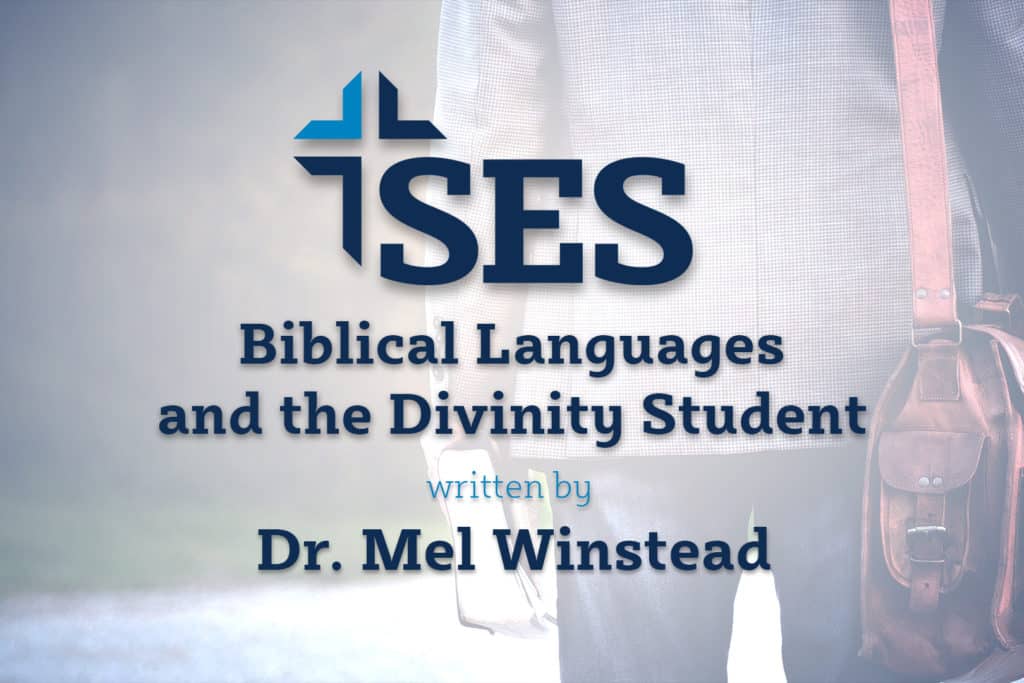[et_pb_section bb_built=”1″][et_pb_row][et_pb_column type=”4_4″][et_pb_text]
Biblical studies at SES prepares students like no other program or school quite does. Our divinity programs provide practical studies as well as classroom lecture and, perhaps most importantly, the biblical languages. Need I quote Luther who said that the languages are the sheath in which the Sword of the Spirit is contained? Additionally, apologetics is about defending the historic Christian faith. Well, the historic Christian faith is brokered in a Book, a book that wasn’t written in English. What this means is that in order to defend the faith, one needs to know the Bible.
As both a professor and a pastor, I have the unique privilege and responsibility to preach God’s Word each week and to teach New Testament Greek at SES. My unique offering to students in this course is that I put the study of Greek into practice each week. In this way, it becomes a part of me, I am able to provide a clearer and more robust explanation of what God has said to His people, and I am able to demonstrate to students through actual passages of the Greek New Testament what learning the language can do for them.
Here’s a “for instance”: instead of only giving exercises to translate and require memory of paradigms (which I do both of the above, and more), I often walk students through a passage that I’ve studied recently for the pulpit and found numerous grammatical or linguistical nuggets. In this way, the students clearly see the cash value of studying the biblical languages. I urge the students each week to make this stuff work for them. “Get mileage out of it,” I tell them. During these times of demonstrating and walking them through the observations I’ve made are the times I see the light bulb go on for students and they began to get passionate about God’s Word. Studying the languages does this for us like no other course is capable of doing. Period.
So, why study the languages? We study the biblical languages in order to develop a fuller awareness of language so that ultimately, we better understand the meaning of the biblical text. We study the biblical languages to hear what God said, instead of what editorial boards or commentators say that God said (though the writings of both these entities is extremely important as well). We study the biblical languages in order to be able to give God’s Word to His people today in as fresh and forceful and clear a way as possible vis-à-vis God gave it to the prophets and apostles.
We have so many language tools at our disposal to the degree that there’s no excuse for not utilizing these in our lesson, devotion, and sermon preparation. One might argue that it is the very fact that we have so many electronic tools, etc., that we don’t need to study the languages. My counter-argument is that this fact – that we have so many tools – confirms the need for knowing the languages so that the students know what they’re looking at, what they’re seeing in these tools. Additionally, in order to keep ourselves from having the wool pulled over our eyes by cults, false teachers, or our own prejudices in interpretation, the languages are a necessity.
Finally, to actually use Greek in defense of using Greek, take 2 Tim 2:15 for instance. In your KJV Bible, you read, “Study to show yourself approved. . .” And most Christians have taken that to refer to Bible study. The word translated “study” means “be diligent,” “do your best,” “give it all you’ve got” to show yourself approved. How? Well, the latter half of the verse tells how, and that’s where careful Bible study comes in. And so, we see that we’re commanded to be diligent at our study of Scripture. How, biblically, can we know that actual scriptural language is called for? Because we see both Jesus and Paul referring to minute details of words and grammar in their argumentation. Jesus says at one point that God has said that He is the God of Abraham . . . . and therefore, He’s the God of the “living.” In John 8:58, Jesus made sure to use the present tense-form of a verb when He said that “before Abraham was born, I am,” not “I was,” but “I currently exist.” And Paul argued at one point on the basis of a singular versus a plural word in a christological point he was making that Christ was being referred to in Gen 3 because the text in Genesis reads not “seeds” but “seed.” And so, we see the value of learning the ins-and-outs of the biblical languages, of learning the many nuances of the Word of God that have been sitting there for centuries waiting to be mined once again and put into the service of the individual and the Church so that God is magnified through it all.
[/et_pb_text][/et_pb_column][/et_pb_row][/et_pb_section]






